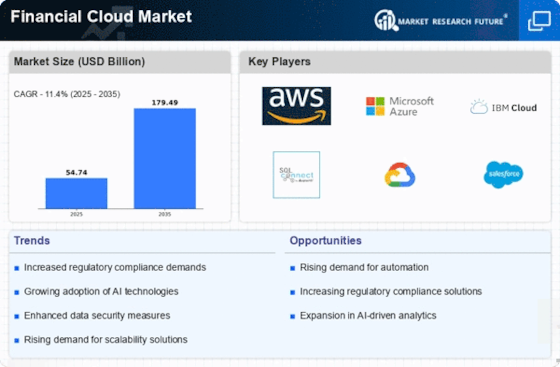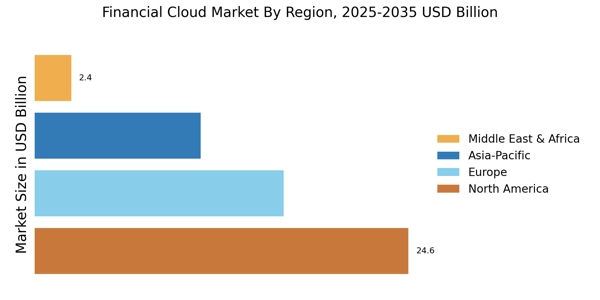Emergence of Fintech Partnerships
The Financial Cloud Market is witnessing the emergence of strategic partnerships between traditional financial institutions and fintech companies. These collaborations aim to leverage the agility and innovation of fintech firms while benefiting from the established infrastructure of traditional banks. Such partnerships often involve the integration of cloud-based solutions to enhance service offerings and streamline operations. It is projected that by 2026, partnerships between banks and fintechs could account for over 40% of the financial services market. This trend not only drives cloud adoption but also fosters a collaborative ecosystem within the Financial Cloud Market, encouraging the development of innovative financial products and services.
Growing Demand for Cost Efficiency
The Financial Cloud Market experiences a notable surge in demand for cost efficiency among financial institutions. As organizations strive to optimize their operational expenditures, the adoption of cloud solutions becomes increasingly attractive. Financial institutions are drawn to the potential for reduced infrastructure costs and the ability to scale resources according to their needs. Reports indicate that the financial services sector could save up to 30% on IT costs by migrating to cloud-based solutions. This trend is likely to continue as firms seek to enhance their financial performance while maintaining competitive advantages. The Financial Cloud Market thus benefits from this growing emphasis on cost-effective solutions, which may drive further innovation and investment in cloud technologies.
Regulatory Compliance and Data Governance
In the Financial Cloud Market, regulatory compliance and data governance emerge as critical drivers. Financial institutions face stringent regulations regarding data protection and privacy, necessitating robust cloud solutions that ensure compliance. The increasing complexity of regulations, such as GDPR and others, compels organizations to adopt cloud services that offer enhanced security and compliance features. It is estimated that compliance-related costs can account for up to 10% of a financial institution's operational budget. Consequently, the demand for cloud solutions that facilitate compliance and data governance is likely to grow, positioning the Financial Cloud Market as a key player in helping organizations navigate these challenges effectively.
Rise of Digital Transformation Initiatives
The Financial Cloud Market is significantly influenced by the rise of digital transformation initiatives across financial services. As institutions seek to modernize their operations and enhance customer experiences, cloud technologies play a pivotal role. The shift towards digital banking, mobile payments, and online investment platforms necessitates scalable and flexible cloud solutions. Recent studies suggest that nearly 70% of financial institutions are prioritizing digital transformation, with cloud adoption being a central component. This trend not only drives demand for cloud services but also fosters innovation within the Financial Cloud Market, as firms explore new ways to leverage technology for improved service delivery.
Increased Focus on Customer-Centric Solutions
In the Financial Cloud Market, there is an increasing focus on customer-centric solutions that enhance user experience. Financial institutions are recognizing the importance of tailoring services to meet the evolving needs of their clients. Cloud technologies enable organizations to gather and analyze customer data effectively, allowing for personalized offerings and improved service delivery. The ability to deploy customer-centric applications rapidly is becoming a competitive advantage. As a result, the demand for cloud solutions that support these initiatives is likely to rise, further propelling growth within the Financial Cloud Market. This shift towards customer-centricity may also encourage innovation in product development and service design.

















